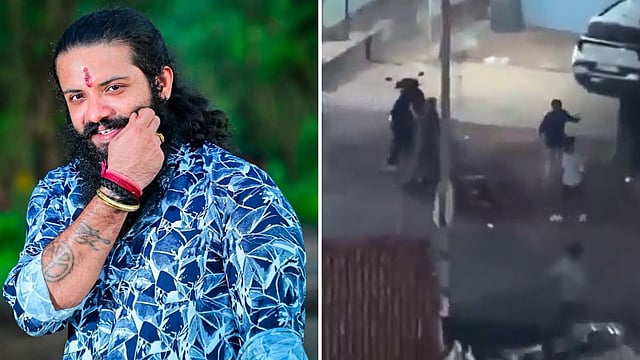– Mohammed Talha Siddi Bapa
Mangaluru, a city known for its coastal vibrance and communal fragility, finds itself once again on the edge. The brutal killing of Suhas Shetty, a man with a long trail of criminal cases – accused in the 2022 communal murder of Muslim youth Mohammed Fazil and the 2020 killing of Keerthi, a Dalit Hindu youth – has not only reignited old wounds but also raised urgent questions. Is this yet another link in the chain of retaliatory violence? Or can it become a moment of reckoning – an opportunity to reflect on the price we pay for glorifying hate, regardless of the victim’s or perpetrator’s religion?
The Incident
On the evening of May 1, 2025, Suhas Shetty, 42, was travelling near Kinnipadavu Cross in Bajpe with a group of friends when two vehicles intercepted his car. Within moments, five to six assailants wielding swords and machetes launched a fatal attack. Though rushed to AJ Hospital, he succumbed to his injuries.
Police investigations point to a possible revenge motive linked to past communal violence, and four special teams have been constituted to track down the perpetrators.
Controversial Past: A Trail of Cases
Suhas Shetty’s life was shadowed by a history of violence and controversy. In 2020, he was the second accused in the murder of a 20-year-old youth named Keerthi in Badaga Yekkaru village. The incident stemmed from a verbal dispute, escalating into a deadly mob assault involving wooden sticks, beer bottles, and knives. Keerthi died of serious injuries, while two others were hospitalised. A case was filed under several IPC sections including 302 (murder), 307 (attempt to murder), and provisions of the SC/ST (Prevention of Atrocities) Act.
More prominently, Suhas was the prime accused in the 2022 murder of Mohammed Fazil – a Muslim youth brutally hacked to death in the crowded Surathkal market area. This, too, was believed to be retaliatory, following the killing of BJP youth leader Praveen Nettaru. That case, like others in Suhas’s record, is still under trial.
He had earlier been convicted in 2016 under IPC Section 160 (affray), acquitted in another assault case in 2020, and remained on trial in multiple cases involving conspiracy, harbouring of offenders, and communal violence.
Tense Aftermath and Law & Order Measures
Shetty’s killing sparked immediate outrage from right-wing groups. The Vishwa Hindu Parishad (VHP) called for a bandh in Dakshina Kannada on May 2, leading to shutdowns and unrest in several pockets. Stone-pelting on public transport was reported, prompting suspension of bus services in parts of Mangaluru.
The Dakshina Kannada Deputy Commissioner swiftly imposed prohibitory orders under Section 144 CrPC until May 5. Mangaluru Police invoked restrictions under Section 163 of the Bharatiya Nagarik Suraksha Sanhita (BNSS), valid till May 6, to ensure public safety.
Government Response: Caution Over Provocation
Karnataka Home Minister Dr. G. Parameshwara called the killing “gruesome” and affirmed that the culprits would be brought to justice. “The state will not tolerate violence from any side,” he said.
District in-charge Minister Dinesh Gundu Rao urged people not to politicise or communalise the issue. “Justice will be ensured, but we must not let such tragedies become fuel for hatred,” he stated.
Amid the volatile atmosphere, Karnataka Assembly Speaker U.T. Khader offered a voice of balance and wisdom. “This is not a political or communal killing. I appeal to the people not to fall prey to divisive narratives,” he said. “We must rise above hate and uphold peace in Mangaluru.”
A Father’s Agony: Grief, Reflection, and Regret
At the heart of the storm stands a broken father. Mohan Shetty, shattered by the death of his son, wept openly before the media. “My son was just 31. He was our family’s support. Now who is left for us?” he asked. “People will visit us for a few days and then forget. We’ve lost everything.”
But in his lament lies a deeper truth. When Suhas was treading the path of violence – accused of taking other people’s sons away – there was no public outcry from home. There was no counsel to stop, no effort to pull him back. Perhaps the father believed, as many do, that violence in the name of identity or ideology is someone else’s problem. Until it wasn’t.
His sorrow today is genuine, but it also serves as a mirror – for all parents, communities, and leaders. The cycle of hatred does not spare its creators. If only voices of restraint had spoken louder then, a life – and a future – might have been saved now.
Communal Shadows and the Road Ahead
The murder of Suhas Shetty has yet again underlined the perils of a society teetering on the edge of polarisation. In regions like coastal Karnataka, each act of bloodshed doesn’t just claim a life – it revives an ecosystem of distrust, propaganda, and mobilisation.
But there is still time to change the narrative. Statements like that of U.T. Khader signal a path forward – where law, not revenge, answers violence; where mourning is met not with mobs, but with introspection.
This is the moment for community leaders, civil society, and especially faith-based organisations to step up – not with slogans or sectarianism, but with clarity, calm, and courage. Because unless the cycle is broken, it will only repeat – more graves, more grieving fathers, more regrets too late to matter.
Let the Loss Lead to Light
The streets of Mangaluru may quieten in the coming days. But the challenge is not over. The true test lies ahead: Will this tragedy be used to inflame, or to awaken?
We owe it to the youth of both communities – not to turn them into symbols or soldiers, but to offer them a future not soaked in inherited hate. Suhas Shetty’s end was violent, but let not his memory be one more reason to continue the violence. Let it be the last.




